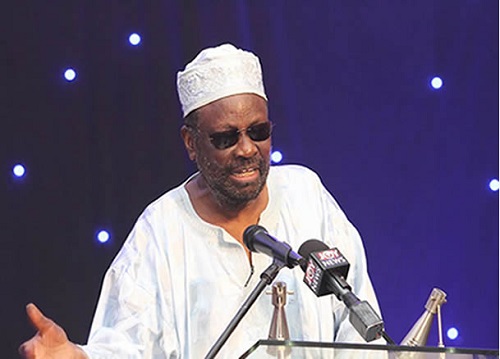Our traditional society was organised in such a clever way that its survival was safeguarded by utilising both the psychological power society can wield over humans, and a deliberate, physical tutoring of humans, against the formidable obstacles thrown across their paths by Nature.
Our sages ensured that right from birth, a person was enveloped in a spiritual world that was signified by the welcoming of the baby as a former member of the family, once alive but called back to the “Far Beyond” (in Twi Asamando).
The baby, it was presumed, had been “sent back” to his/her family, perhaps to “complete” the task an ancestor had started but had not finished.
So, a child was named after its mother’s dead father or mother, or its father’s dead mother or father. Next, names are taken from the baby’s great-grandparents. After that the names of ancestors who had, during their lifetime, achieved social prominence. Then as a special departure, great friends of the couple, who had departed this life, might have their names revived through the new arrival.
Certain qualities are looked for in the lives of the departed people after whom it is proposed that the baby should be named. Personal honesty and integrity; industriousness; wisdom; and physical attractiveness, are among the virtues that usually work together to get a dead person’s name revived by being given to a newborn child.
As the child grows up, its parents and extended family try to guide him/her towards the qualities of the person he/she is named after. A bad child will often be “called out” by the full name given to him/her, as a “coded” sign that its relatives (who remember the respect in which that name was once held) now regard it as a mistake that the child was named after their illustrious ancestor. If the child continues its waywardness, it can expose its parents to hatred or ridicule.
Now, it’s is not only names that a child is made to grow up to respect. It would also be taught that certain physical objects are not to be desecrated. These include rivers and streams; certain very old trees; and unusual landmarks such as hills, hillocks and valleys. And cemeteries, of course.
Respect for rivers and streams comes first. In the Akan areas of Ghana (and I am certain in other areas) rivers and streams are deliberately given human names. In my town, Asiakwa, in the Eastern Region (for instance) the two main rivers that existed in my childhood (but both of which have now been killed off by galamsey activity!) the bigger one, Supɔn, was called “Akwasi, while the second, smaller one, Twafoɔ, was called “Yaw”.
To enshrine its status as our sole means of “water insurance” (that is, in case the bigger Supɔn dried up during a drought) Twafoɔ was expected to “never dry” but stay alive to give us water to drink! Twafoɔ was thus provided with a special shrine, at which ceremonies took place during such festivals as Odwira or Ohum.
It had its own venerated priestess, an old lady who led processions, declaiming: Ggbooo-gboooo!…Gboooo-gboooo! (in imitation of the roaring of a river. ) She interspersed these onomatopoeic words a real self-proclamation, thus:
Gboooo-gbogbooo! Gboooo-gboooo!
Me nono ooo!
Twafo Yaw!
Asuo ketewa a miyiri pɛ berɛ!
(That’s me, [ROARING!)
Twafo Yaw!
The little river
Who chooses the dry season
In which to flood his banks!)
Flooding in the dry season? It’s an unforgettable concept, isn’t it? It tells you how much rivers and streams meant to our ancestors.
A child exposed to such ceremonies can seamlessly absorb – both at the conscious and sub-conscious levels – the philosophical concepts in our poem-songs (such as those I’ve just quoted.) But, of course, as a human being, the eventual character of such a child, can never be foretold.
Indeed, even those Ghanaian galamseyers who secretly procure excavators and chanfangs to turn our rivers upside down, seeking gold from the very riverbeds, know what taboos they are infringing. It’s not for nothing that they have been fighting to get our government to characterise their crime as “small-scale mining,” is it?
As the First Deputy Speaker, of the National Assembly, Mr Joe Osei-Owusu, asked (in his role as the chair of the Appointments Committee) of Mr Abu Jinapor (then prospective Minister of Lands and Natural Resources): “What is ‘small-scale‘ about taking excavators to rivers and digging them up for gold”?
‘Joe Wise’ might well have also asked: “How do ‘small-scale miners’ manage to get changangs brought to them from China, to be used for refining gold from sand and pebbles dug up from the riverbeds by excavators?” …. Or: “How do small-scale miners get money to buy pump-action shotguns and/or AK47s to give to their Chinese collaborators to stand guard against interference with their gold-digging in our deep forests?”…. And: “What is ‘small-scale’ about managing to organise ‘Mafia-type’ socio-political networks that are able to ensure that hirelings can drive excavators and chanfangs past police roadblocks without being detained; and why do so many arrested excavators get given back to their owners, after being taken to police stations”?
Mr Jinapor may or may not have realised that the question ‘Joe Wise’ put to him at his vetting was a rhetorical one. He’d be wise not to regard the opinions he heard at the National Dialogue on Small-scale Mining on 14-15 April as the weak murmurings of a nation that can be easily swayed with words. The truth is that the Ghanaian people are sick to death of hearing words that lead to no action. Words against a nefarious practice that everybody “condemns” with their lips – but which continues unabated!
By Cameron Duodu


